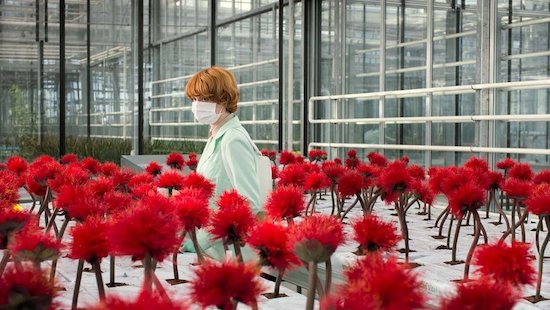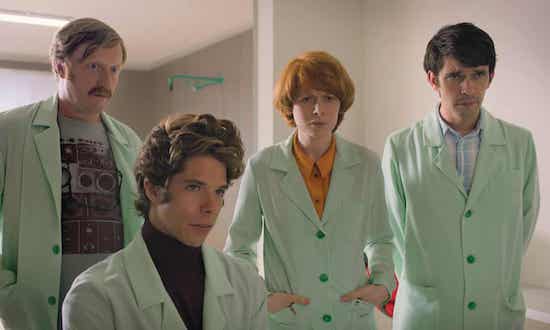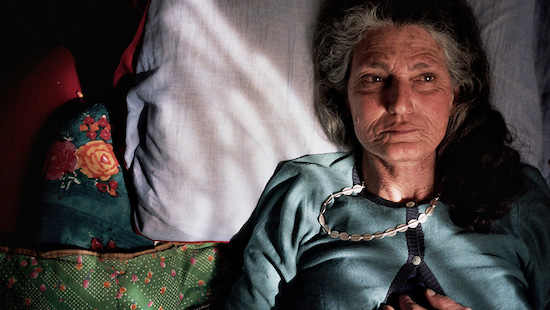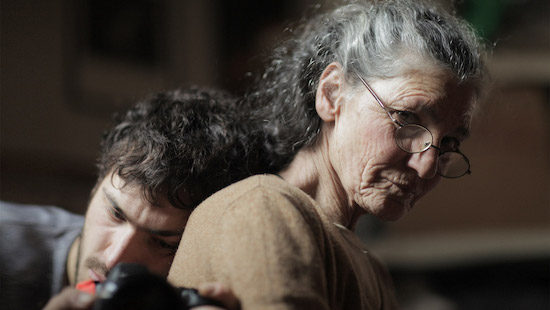Film: An Invasion and a Disappearance
Little Joe, Austrian director Jessica Hausner’s first English-language film, is as spare and deliberate as it is visually arresting. With its chilly tone and gorgeous, pastel-hued visuals, the sci-fi drama is both beautiful and creepy, despite a familiar plot.
The film opens with an overhead shot of row-upon-symmetrical-row of red-hued plants in a sterile, brightly lit lab, staffed by technicians in lab coats. New to Planthouse Biotechnologies, Alice (Emily Beecham, who won Best Actress award for the film at Cannes), is lead scientist on this particular project. She has succeeded in synthetically breeding plants that will emit a scent with antidepressant properties in exchange for an abundance of TLC, including temperature control and affectionate conversation. Alice and her associate Chris (a solid-as-always Ben Whishaw) discuss the plant’s readiness for market, specifically the fast-approaching Plant Fair at which it will be unveiled. Already, we feel a sense of foreboding, as the scene is punctuated by Teiji Ito and Markus Binder’s spare, haunting score.
The divorced Alice lives with her son Joe, a young teen who believes that she and Chris would make a great couple, but she has no time for romance, what with the upcoming debut of “Little Joe” (the plant is named after her son). Alice discusses this with her therapist (Lindsay Duncan), along with foreshadowy concerns about her son and the frankenplant itself. (“You never know what might happen.”) She also goes against lab protocol and brings a plant home, which seems like a very bad idea.
Soon, Bella (an excellent Kerry Fox), a senior scientist at the lab with a history of mental problems (of course), sounds the first warning about Little Joe, citing its effects on her dog, but neither Alice, Chris, nor the other lab workers take her seriously (of course). Eventually Bella asks Alice, “Which of your children will you choose?”
As Little Joe’s powers become more apparent, the musical score becomes intrusively, atonally anxious, reminiscent of Bernard Herrmann (Psycho). Joking references to the film’s obvious predecessor, Invasion of the Body Snatchers (“It’s not like they become zombies!”), signal Hausner’s homage, but Little Joe is not quite another remake. Its chilly charms are quite effective, though not really engaging on an emotional level. Little Joe is a treat for the head if not the heart.
Opening the same day, Beniamino Barrese’s documentary The Disappearance of My Mother is another sort of mystery. The titular mom, Benedetta Barzino, is an iconoclastic Italian celebrity—a former fashion model turned feminist lecturer and journalist. After a lifetime in the spotlight, the 70-something Barzino expresses the desire to “disappear.” As her son Beniamino notes early in the film, “When she told me she was leaving and not coming back, I realized I was not ready to let her go.”
What follows is a fascinating, sometimes perplexing film about a woman’s desire to leave the world she’s always known and her son’s seeming need to capture every last moment of her current life.
Because its subject is charismatic, contradictory character who hasn’t lost the ability to hold the camera, the film is intriguing despite Benedetta’s clear reluctance to take part. Her contempt for film (“It’s a lie …The lens is the enemy”) makes the whole project a bit ironic and unsettling, yet there is obviously a close bond between mother and son.
Visually, the documentary is striking; early black and white footage of the dewy young model is juxtaposed with scenes of the older Benedetta puttering at home, lecturing fashion students about the oppressive nature of the industry (“Why does imperfection upset people?”), making a few public appearances, and even sleeping and waking. She curses her son’s intrusive camera throughout, yet he continues filming, seemingly oblivious to her wishes. Despite her feelings, she takes part in London Fashion Week, walking the runway with great presence. At one point, her old friend Lauren Hutton visits; she too objects to Beniamino’s intrusive filming. In several scenes, Beniamino captures Benedetta alone in a crowd, where she looks haunted and hunted — including at her own birthday party,
Alternatively coughing and smoking, Benedetta is obviously ill, but we don’t know how seriously. The big question is the exact nature of her “leaving”… Is it a metaphor for death? Is it more literal?
Beniamino, who seems to have obsessively documented his mother since childhood, includes some playful early footage. We also see him casting women to portray his mother as a young women, as they read aloud from her writing.
How much of this is a gimmick? Hard to say, though Benedetta certainly seems sincere in her desire to leave her life behind, and there are scenes of her packing and purging possessions. At the end of the film, Beniamino shoots a few clearly manufactured endings, before he and Benedetta come up with a perfect one. It’s a neat resolution to a somewhat messy film that is both a portrait of a fascinating woman and a glimpse into an unusual mother-son relationship.
Little Joe and The Disappearance of My Mother open in NYC at the Quad Cinema on Friday, Dec. 6. (Little Joe will also be available On Demand.)
—Marina Zogbi





